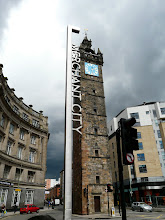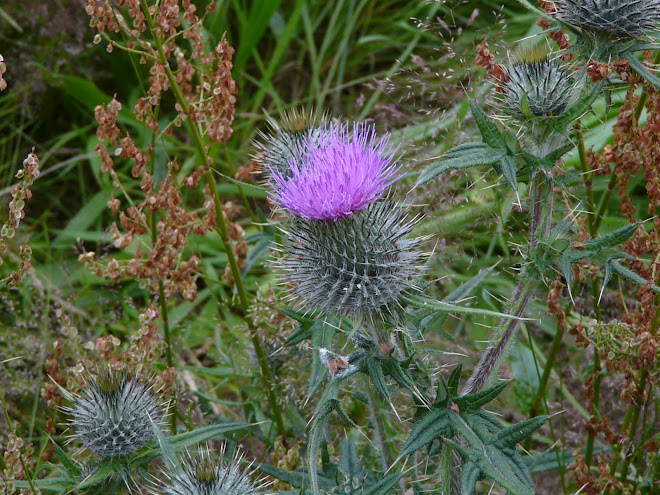Los premios Nobel Ig....investigación que mueve al mundo. El año pasado nos dió a conocer un memorable estudio, sepultado en las montañas de nuevo conocimiento publicado cada año:
LINGUISTICS: Juan Manuel Toro, Josep B. Trobalon and Núria Sebastián-Gallés, of Universitat de Barcelona, for showing that rats sometimes cannot tell the difference between a person speaking Japanese backwards and a person speaking Dutch backwards.
REFERENCE: "Effects of Backward Speech and Speaker Variability in Language Discrimination by Rats," Juan M. Toro, Josep B. Trobalon and Núria Sebastián-Gallés, Journal of Experimental Psychology: Animal Behavior Processes, vol. 31, no. 1, January 2005, pp 95-100.
WHO ATTENDED THE CEREMONY: The winners could not travel to the ceremony, so they instead delivered their acceptance speech via recorded video
Traducción: Algo así como: Premio en Lingüística
Por mostrar que las ratas, en algunas ocasiones, no pueden percibir la diferencia entre una persona hablando japonés y una hablando holandés, cuando estas últimas se encuentran de espaldas a ellas....¡¡¡¡!!!!Memorable!!!!
Y los ganadores de este año son:
(Traducción de El Universal....no me responsabilizo por la calidad de la misma...)
Paz:
El Comité Federal Suizo de Ética sobre Tecnología no Humana, y el resto de ciudadanos suizos, por aprobar en abril pasado el principio legal de que las plantas tienen dignidad.
Literatura:
El británico David Sims, de la Cass Business School de Londres, por su estudio, apasionadamente escrito, "Bastardo: Una Exploración Narrativa de la Experiencia de Indagar dentro de las Organizaciones".
Medicina:
El estadounidense Dan Ariely, por demostrar que la medicina falsa pero cara funciona mejor que la medicina falsa y barata. Publicó su estudio en el Journal of American Medical Association.
Ciencias cognitivas:
Toshiyuki Nakagaki, Hiroyasu Yamada, Ryo Kobayashi, Atsushi Tero y Akio Ishiguro, todos ellos japoneses, y Agota Toth, húngaro, por demostrar en "Nature" que el moho mucilaginoso puede resolver puzzles.
Nutrición:
Maximiliano Zampini (Universidad de Trento) y Charles Spencer (Universidad de Oxford), por demostrar que la comida sabe mejor si es crujiente, en un estudio publicado en "Journal of Sensory Studies".
Biología:
Marie-Christine Cadiergues, Christel Joubert y Michel Franc, de la Facultad de Veterinaria de Toulouse (Francia), por demostrar que las pulgas saltan más sobre los perros que sobre los gatos, en un artículo en "Veterinary Parasitology".
Química (compartido):
Los estadounidenses Sheree Umpierre, Joseph Hill y Deborah Anderson, por descubrir que la Coca-Cola es un espermicida efectivo, publicado por "New England Journal of Medicine", y los taiwaneses C.Y. Hong, C.C. Shieh, P. Wu y B.N. Chiang, por descubrir justo lo contrario y publicarlo en "Human Toxicology".
Física:
Los estadounidenses Dorian Raymer y Douglas Smith, por probar que un montón de cuerdas, pelos o cualquier otra cosa acaba enredándose y formar nudos, en "Proceedings of the National Academy of Sciences" (PNAS).
Arqueología:
Astolfo Gomes de Mello Araujo y Jose Carlos Marcelino, de la Universidad de Sao Paulo (Brasil), por descubrir hasta qué punto los armadillos pueden desordenar los restos en una excavación arqueológica. La investigación se publicó en "Geoarchaeology".
Economía:
Geoffrey Millar, Joshua Tyber y Brent Jordan, de la Universidad de Nuevo México (EU), por descubrir que las ganancias de una bailarina de "striptease" dependen de su ciclo menstrual. Lo publicaron en "Evolution and Human Behavior".
Y aquí la versión original
The 2008 Ig Nobel Prize Winners
The 2008 Ig Nobel Prizes were awarded on Thursday night, October 2, at the 18th First Annual Ig Nobel Prize Ceremony, at Harvard's Sanders Theatre. We will soon post video of the ceremony.
NUTRITION PRIZE. Massimiliano Zampini of the University of Trento, Italy and Charles Spence of Oxford University, UK, for electronically modifying the sound of a potato chip to make the person chewing the chip believe it to be crisper and fresher than it really is.
REFERENCE: "The Role of Auditory Cues in Modulating the Perceived Crispness and Staleness of Potato Chips," Massimiliano Zampini and Charles Spence, Journal of Sensory Studies, vol. 19, October 2004, pp. 347-63.
PEACE PRIZE. The Swiss Federal Ethics Committee on Non-Human Biotechnology (ECNH) and the citizens of Switzerland for adopting the legal principle that plants have dignity.
REFERENCE: "The Dignity of Living Beings With Regard to Plants. Moral Consideration of Plants for Their Own Sake"
WHO ATTENDED THE CEREMONY: Urs Thurnherr, member of the committee.
ARCHAEOLOGY PRIZE. Astolfo G. Mello Araujo and José Carlos Marcelino of Universidade de São Paulo, Brazil, for measuring how the course of history, or at least the contents of an archaeological dig site, can be scrambled by the actions of a live armadillo.
REFERENCE: "The Role of Armadillos in the Movement of Archaeological Materials: An Experimental Approach," Astolfo G. Mello Araujo and José Carlos Marcelino, Geoarchaeology, vol. 18, no. 4, April 2003, pp. 433-60.
BIOLOGY PRIZE. Marie-Christine Cadiergues, Christel Joubert,, and Michel Franc of Ecole Nationale Veterinaire de Toulouse, France for discovering that the fleas that live on a dog can jump higher than the fleas that live on a cat.
REFERENCE: "A Comparison of Jump Performances of the Dog Flea, Ctenocephalides canis (Curtis, 1826) and the Cat Flea, Ctenocephalides felis felis (Bouche, 1835)," M.C. Cadiergues, C. Joubert, and M. Franc, Veterinary Parasitology, vol. 92, no. 3, October 1, 2000, pp. 239-41.
MEDICINE PRIZE. Dan Ariely of Duke University, USA, for demonstrating that high-priced fake medicine is more effective than low-priced fake medicine.
REFERENCE: "Commercial Features of Placebo and Therapeutic Efficacy," Rebecca L. Waber; Baba Shiv; Ziv Carmon; Dan Ariely, Journal of the American Medical Association, March 5, 2008; 299: 1016-1017.
WHO ATTENDED THE CEREMONY: Dan Ariely
COGNITIVE SCIENCE PRIZE. Toshiyuki Nakagaki of Hokkaido University, Japan, Hiroyasu Yamada of Nagoya, Japan, Ryo Kobayashi of Hiroshima University, Atsushi Tero of Presto JST, Akio Ishiguro of Tohoku University, and Ágotá Tóth of the University of Szeged, Hungary, for discovering that slime molds can solve puzzles.
REFERENCE: "Intelligence: Maze-Solving by an Amoeboid Organism," Toshiyuki Nakagaki, Hiroyasu Yamada, and Ágota Tóth, Nature, vol. 407, September 2000, p. 470.
WHO ATTENDED THE CEREMONY: Toshiyuki Nakagaki, Ryo Kobayashi, Atsushi Tero
ECONOMICS PRIZE. Geoffrey Miller, Joshua Tybur and Brent Jordan of the University of New Mexico, USA, for discovering that a professional lap dancer's ovulatory cycle affects her tip earnings.
REFERENCE: "Ovulatory Cycle Effects on Tip Earnings by Lap Dancers: Economic Evidence for Human Estrus?" Geoffrey Miller, Joshua M. Tybur, Brent D. Jordan, Evolution and Human Behavior, vol. 28, 2007, pp. 375-81.
WHO ATTENDED THE CEREMONY: Geoffrey Miller and Brent Jordan
PHYSICS PRIZE. Dorian Raymer of the Ocean Observatories Initiative at Scripps Institution of Oceanography, USA, and Douglas Smith of the University of California, San Diego, USA, for proving mathematically that heaps of string or hair or almost anything else will inevitably tangle themselves up in knots.
REFERENCE: "Spontaneous Knotting of an Agitated String," Dorian M. Raymer and Douglas E. Smith, Proceedings of the National Academy of Sciences, vol. 104, no. 42, October 16, 2007, pp. 16432-7.
WHO ATTENDED THE CEREMONY: Dorian Raymer
CHEMISTRY PRIZE. Sharee A. Umpierre of the University of Puerto Rico, Joseph A. Hill of The Fertility Centers of New England (USA), Deborah J. Anderson of Boston University School of Medicine and Harvard Medical School (USA), for discovering that Coca-Cola is an effective spermicide, and to Chuang-Ye Hong of Taipei Medical University (Taiwan), C.C. Shieh, P. Wu, and B.N. Chiang (all of Taiwan) for discovering that it is not.
REFERENCE: "Effect of 'Coke' on Sperm Motility," Sharee A. Umpierre, Joseph A. Hill, and Deborah J. Anderson, New England Journal of Medicine, 1985, vol. 313, no. 21, p. 1351.
REFERENCE: "The Spermicidal Potency of Coca-Cola and Pepsi-Cola," C.Y. Hong, C.C. Shieh, P. Wu, and B.N. Chiang, Human Toxicology, vol. 6, no. 5, September 1987, pp. 395-6. [NOTE: THE JOURNAL LATER CHANGED ITS NAME. NOW CALLED "Human & experimental toxicology"]
WHO ATTENDED THE CEREMONY: Deborah Anderson, and C.Y. Hong's daughter Wan Hong
LITERATURE PRIZE. David Sims of Cass Business School. London, UK, for his lovingly written study "You Bastard: A Narrative Exploration of the Experience of Indignation within Organizations."
REFERENCE: "You Bastard: A Narrative Exploration of the Experience of Indignation within Organizations," David Sims, Organization Studies, vol. 26, no. 11, 2005, pp. 1625-40.
WHO ATTENDED THE CEREMONY: David Sims
Sunday, 5 October 2008
Subscribe to:
Post Comments (Atom)












No comments:
Post a Comment